Do you want to pass Microsoft 70-533 Exam ? If you answered YES, then look no further. Braindump2go offers you the best 70-533 exam questions which cover all core test topics and certification requirements. All REAL questions and answers from Microsoft Exam Center will help you be a 70-533 certified!
Vendor: Microsoft
Exam Code: 70-533
Exam Name: Implementing Microsoft Azure Infrastructure Solutions
Keywords: 70-533 Exam Dumps,70-533 Practice Tests,70-533 Practice Exams,70-533 Exam Questions,70-533 PDF,70-533 VCE Free,70-533 Book,70-533 E-Book,70-533 Study Guide,70-533 Braindump,70-533 Prep Guide

QUESTION 51
Drag and Drop Question
You manage an Azure Web Site named salessite1.
You notice some performance issues with salessite1.
You create a new database for salessite1.
You need to update salessite1 with the following changes, in the order shown:
1. Display the list of current connection strings.
2. Create a new connection string named conn1 with a value of:
Server=tcp:samplel.database.windows.net,1433;
Database=NewDB;
User ID=User@samplel;
Password=Passwordl;
Trusted_Connection=False;
Encrypt=True;
Connec tion Timeout=30;.
3. Download the application logs for analysis.
Which three xplat-cli commands should you perform in sequence? To answer, move the appropriate commands from the list of commands to the answer area and arrange them in the correct order.
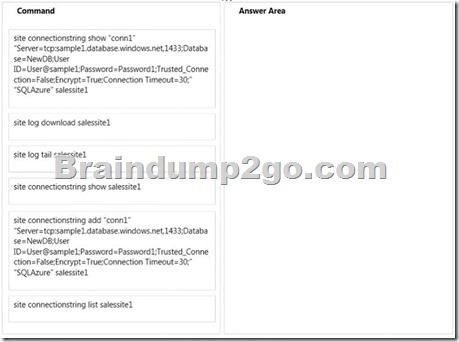
Answer:
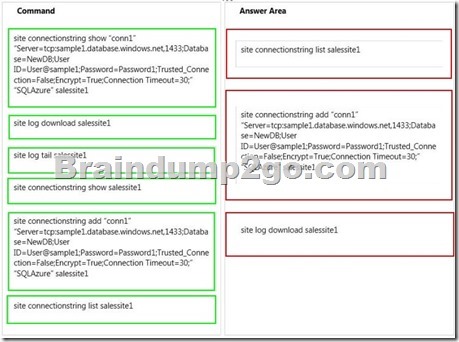
QUESTION 52
Hotspot Question
You manage an Azure Service Bus for your company.
You plan to enable access to the Azure Service Bus for an application named ContosoLOB.
You need to create a new shared access policy for subscriptions and queues that has the following requirements:
– Receives messages from a queue
– Deadletters a message
– Defers a message for later retrieval
– Enumerates subscriptions
– Gets subscription description
In the table below, identify the permission you need to assign to ensure that ContosoLOB is able to accomplish the above requirements. Make only one selection in each column.
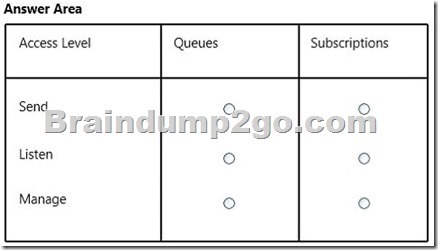
Answer:
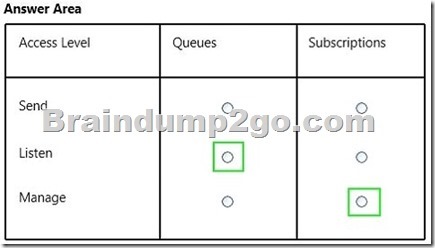
Explanation:
http://msdn.microsoft.com/en-us/library/azure/dn205160.aspx
QUESTION 53
Your network includes a legacy application named LegacyApp1.
The application only runs in the Microsoft .NET 3.5 Framework on Windows Server 2008.
You plan to deploy to Azure Cloud Services.
You need to ensure that LegacyApp1 will run correctly in the new environment.
What are two possible ways to achieve this goal? Each correct answer presents a complete solution.
A. Upload a VHD with Windows Server 2008 installed.
B. Deploy LegacyApp1 to a cloud service instance configured with Guest OS Family 2.
C. Deploy LegacyApp1 to a cloud service instance configured with Guest OS Family 1.
D. Deploy LegacyApp1 to a cloud service instance configured with Guest OS Family 3.
Answer: BC
Explanation:
Guest OS Family 1 and Guest OS Family 2 supports .NET 3.5 and .Net 4.0. Guest OS Family 3 and Guest OS Family 4 supports .NET 4.0 and .Net 4.5.
http://msdn.microsoft.com/en-us/library/azure/ee924680.aspx
QUESTION 54
Drag and Drop Question
You administer a cloud service named contosoapp that has a web role and worker role.
Contosoapp requires you to perform an in-place upgrade to the service.
You need to ensure that at least six worker role instances and eight web role instances are available when you apply upgrades to the service.
You also need to ensure that updates are completed for all instances by using the least amount of time.
Which value should you use with each configuration? To answer, drag the appropriate value to the correct configuration. Each value may be used once, more than once, or not at all. You may need to drag the split bar between panes or scroll to view content.
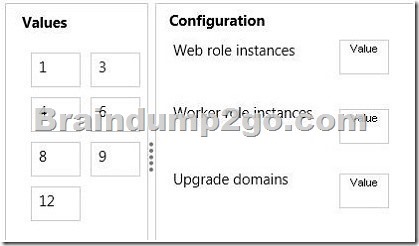
Answer:
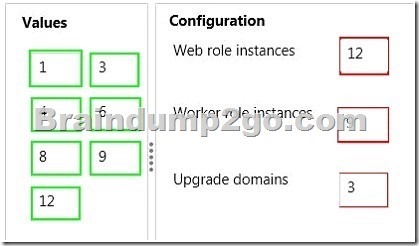
QUESTION 55
You migrate a Windows Server .NET web application to Azure Cloud Services.
You need enable trace logging for the application.
Which two actions should you perform? Each correct answer presents part of the solution.
A. Update the service definition file.
B. Update the Azure diagnostics configuration.
C. Update the service configuration file.
D. Enable verbose monitoring.
E. Update the application web.config file.
Answer: AB
Explanation:
You can use Azure logging right out of the box–it’s part of Azure SDK.
A: Azure Service Definition Schema (.csdef File) The service definition file defines the service model for an application. The file contains the definitions for the roles that are available to a cloud service, specifies the service endpoints, and establishes configuration settings for the service.
B: Take Control of Logging and Tracing in Microsoft Azure The Microsoft.WindowsAzure.Diagnostics namespace, which inherits from and extends standard System.Diagnostics classes, enables the use of System.Diagnostics as a logging framework in Azure environment.
http://msdn.microsoft.com/en-us/library/azure/ee758711.aspx
http://msdn.microsoft.com/en-us/magazine/ff714589.aspx
QUESTION 56
Drag and Drop Question
You plan to deploy a cloud service named contosoapp. The service includes a web role named contosowebrole. The web role has an endpoint named restrictedEndpoint.
You need to allow access to restricted Endpoint only from your office machine using the IP address 145.34.67.82.
Which values should you use within the service configuration file? To answer, drag the appropriate value to the correct location in the service configuration file. Each value may be used once, more than once, or not at all. You may need to drag the split bar between panes or scroll to view content.
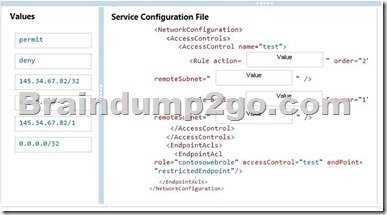
Answer:
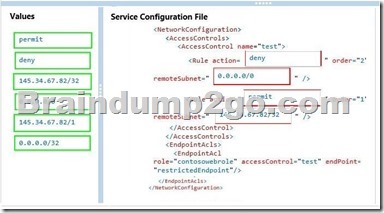
QUESTION 57
You manage a cloud service that utilizes an Azure Service Bus queue.
You need to ensure that messages that are never consumed are retained.
What should you do?
A. Check the MOVE TO THE DEAD-LETTER SUBQUEUE option for Expired Messages in the Azure Portal.
B. From the Azure Management Portal, create a new queue and name it Dead-Letter.
C. Execute the Set-AzureServiceBus PowerShell cmdlet.
D. Execute the New-AzureSchedulerStorageQueueJob PowerShell cmdlet.
Answer: A
Explanation:
The EnableDeadLetteringOnMessageExpiration property allows to enable\disable the dead-lettering on message expiration.
QUESTION 58
You manage a web application published to Azure Cloud Services.
Your service level agreement (SLA) requires that you are notified in the event of poor performance from customer locations in the US, Asia, and Europe.
You need to configure the Azure Management Portal to notify you when the SLA performance targets are not met.
What should you do?
A. Create an alert rule to monitor web endpoints.
B. Create a Notification Hub alert with response time metrics.
C. Add an endpoint monitor and alert rule to the Notification Hub.
D. Configure the performance counter on the cloud service.
Answer: A
Explanation:
* An alert rule enables you to monitor an available metric within a supported Azure service. When the value of a specified metric violates the threshold assigned for a rule, the alert rule becomes active and registers an alert. When you create an alert rule, you can select options to send an email notification to the service administrator and co- administrators, or another administrator, when the rule becomes active, and when an alert condition is resolved.
* You can configure cloud service alert rules on:
Web endpoint status metrics
Monitoring metrics from the cloud service host operating system Performance counters collected from the cloud service guest virtual machine
http://msdn.microsoft.com/en-us/library/azure/dn306639.aspx
QUESTION 59
You manage a cloud service that hosts a customer-facing application. The application allows users to upload images and create collages. The cloud service is running in two medium instances and utilizes Azure Queue storage for image processing.
The storage account is configured to be locally redundant.
The sales department plans to send a newsletter to potential clients. As a result, you expect a significant increase in global traffic.
You need to recommend a solution that meets the following requirements:
– Configure the cloud service to ensure the application is responsive to the traffic increase.
– Minimize hosting and administration costs.
What are two possible ways to achieve this goal? Each correct answer presents a complete solution.
A. Configure the cloud service to run in two Large instances.
B. Configure the cloud service to auto-scale to three instances when processor utilization is above 80%.
C. Configure the storage account to be geo-redundant
D. Deploy a new cloud service in a separate data center.
Use Azure Traffic Manager to load balance traffic between the cloud services.
E. Configure the cloud service to auto-scale when the queue exceeds 1000 entries per machine.
Answer: BE
Explanation:
* An autoscaling solution reduces the amount of manual work involved in dynamically scaling an application. It can do this in two different ways: either preemptively by setting constraints on the number of role instances based on a timetable, or reactively by adjusting the number of role instances in response to some counter(s) or measurement(s) that you can collect from your application or from the Azure environment.
QUESTION 60
You manage a cloud service on two instances.
The service name is Service1 and the role name is ServiceRole1.
Service1 has performance issues during heavy traffic periods.
You need to increase the existing deployment of Service1 to three instances.
Which Power Shell cmdlet should you use?
A. PS C:\>Set-AzureService -ServiceName “Service1” -Label “ServiceRole1′ -Description “Instance count=3”
B. PS C:\>Set-AzureRole -ServiceName “Service1” -Slot “Production” -RoleName “ServiceRole1” -Count 3
C. PS C:\>Add-AzureWebRole -Name ‘ServiceRole1″ -Instances 3
D. PS C:\> $instancecount = New-Object Hashtable$settings[‘INSTANCECOUNT=3]
PS C:\> Set-AzureWebsite -AppSettings $instancecount ServiceRole1
Answer: B
Explanation:
The Set-AzureRole cmdlet sets the number of instances of a specified role to run in an Azure deployment
Example
This command sets the “MyTestRole3” role running in production on the “MySvc1” service to three instances.
Windows PowerShell
C:\PS>Set-AzureRole ServiceName “MySvc1” Slot “Production” RoleName
“MyTestRole3” Count 3
Braindump2go Regular Updates of Microsoft 70-533 Preparation Materials Exam Dumps, with Accurate Answers, Keeps the Members One Step Ahead in the Real 70-533 Exam. Field Experts with more than 10 Years Experience in Certification Field work with us.
